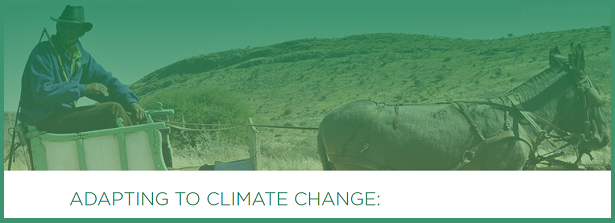This interactive seminar “Adapting to climate change: Community based adaptation in multi-stkaeholder landscapes” is a follow-up from last year’s conference Climate Change Interventions as a Source of Conflict, Cooperation and New Mobilities. Keynote speakers are Arun Agrawal from the University of Michigan and Jun Borras from ISS The Hague.

Climate change is amongst the most prominent developmental issues today. As a result, large amounts of capital are being made available to strengthen resilience and adaptive capacity of climate-vulnerable people, particularly in the global South. In the African drylands, for example, this includes interventions aimed at crop farming, such as, the introduction of improved crop and seed varieties; initiating dry-season farming by tapping existing irrigation potential, introducing improved agricultural practices through, for instance, water-harvesting methods; and mechanisms to enable the diversification of livelihoods and income streams, but also, for instance, by establishing laws and by-laws for the preservation of existing forests (and reforestation), which not only sequester carbon, but also serve as an important livelihood source for landless groups.
Yet adaptation is rarely the technical, apolitical process which it is framed as being. Instead, it creates new winners and losers, exacerbating conflict and the risk of conflict, as well as forging new alliances within and between scales. Adaptation interventions aimed at addressing the negative impacts of climate change may have unintended impacts beyond the temporal and/or spatial parameters of the project itself an can in fact change the configurations of the distribution of access to, and control over, scarce natural resources. There is little understanding, however, of the potential for adaptation interventions to exacerbate conflict within and between communities.
Bottom-up, participatory, community-based approaches – where local actors participate in the selection of and decision-making about adaptation strategies to be pursued in their area – are commonly presented as a requirement for successful interventions. This notion is fundamentally embedded in popular adaptation programming, such as Ecosystems-Based Adaptation (EBA) and Community-Based Adaptation (CBA).
Yet despite the emphasis on community participation in adaptation, the ‘communities’ themselves are increasingly implied as abstracted, isolated, homogenous and static units, through which resilience is automatically strengthened. In reality, we know very well that communities are also sites of internal conflict and changing patterns of cooperation. They exist in complex, multi-stakeholder landscapes where competing claims to natural resources are intertwined in fragile and sometimes violent relations between different livelihoods, ethnicities, gender, generation and political affiliations, with, in many instances, very different definitions of sustainability.
There is very little critical reflection on what we can really learn from local communities and their indigenous or local knowledge systems. What roles do local communities play in global climate change adaptation? Are bottom-up approaches really community-centred, or even effective? To what extent can conflict within or between communities be exacerbated by adaptation interventions? This conference will contribute to discussions about the role of communities in adaptation, as well as the position of other stakeholders (such as private or state actors) who often compete with involved communities over access to scarce natural resources, in view of the question: how to make adaptation interventions more participatory, inclusive and conflict-sensitive?
- This event has passed.

